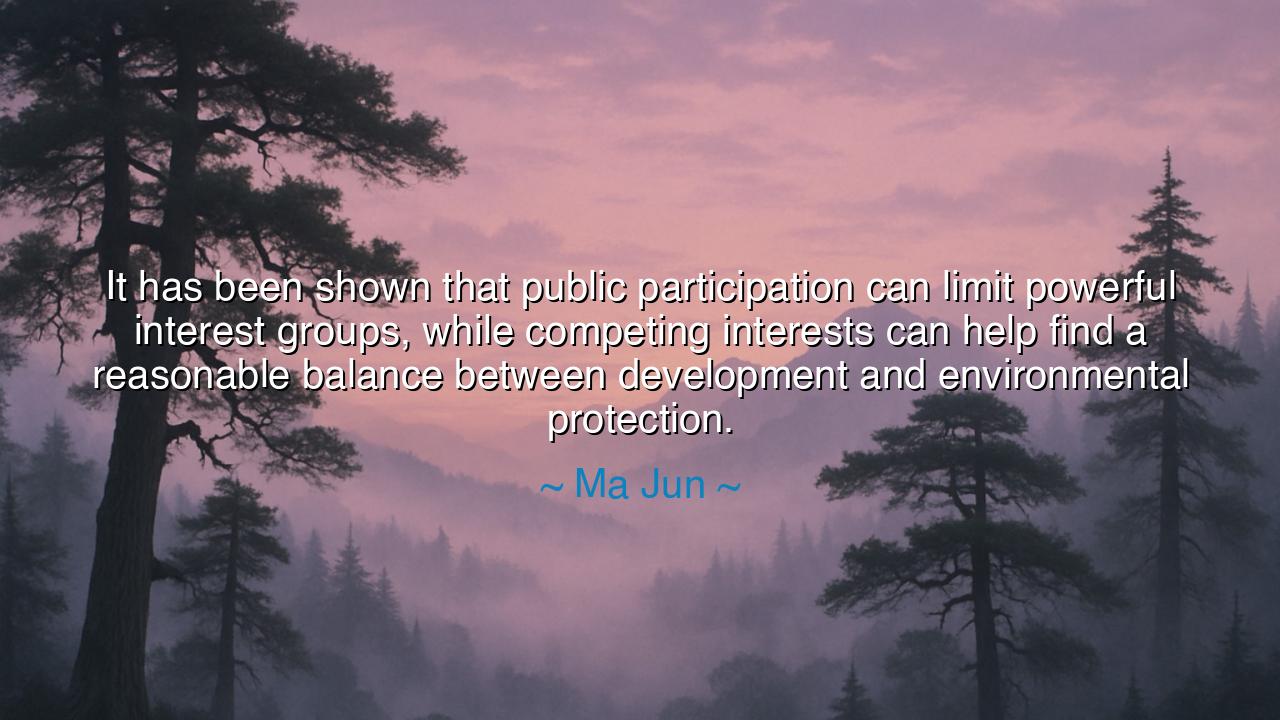
It has been shown that public participation can limit powerful
It has been shown that public participation can limit powerful interest groups, while competing interests can help find a reasonable balance between development and environmental protection.






Hear the measured wisdom of Ma Jun, a man who has long raised his voice for the rivers and skies of his homeland: “It has been shown that public participation can limit powerful interest groups, while competing interests can help find a reasonable balance between development and environmental protection.” In these words, he does not speak with the fury of a rebel, but with the calm strength of one who has seen the tide of change and knows its source: the people themselves. For power unchecked becomes tyranny, but power restrained by the voices of the many can be turned toward justice.
At the heart of his teaching lies the power of public participation. Governments and corporations often speak of progress, of building highways, factories, or dams, but too often they consult only their own desires. Yet when the people—farmers, workers, students, mothers—raise their voices, they remind the rulers of truths they would otherwise ignore. They remind them that development without restraint poisons the very soil from which progress springs. Public participation is not chaos; it is the heartbeat of democracy, the conscience of the land.
Ma Jun also speaks of competing interests, a phrase filled with ancient wisdom. For in the clash of perspectives lies the seed of balance. If only the voice of industry is heard, the forests are cut, the rivers dammed, the air blackened. If only the voice of preservation is heard, progress itself may wither, and people may live in want. But when voices meet—farmers seeking water, workers seeking wages, citizens seeking health, activists seeking clean skies—then compromise is born. Out of many needs, a path can be carved that honors both life and livelihood.
History itself bears witness. In the United States of the 1960s and 70s, factories belched smoke unchecked, rivers caught fire from pollution, and yet corporations resisted change. But when the people rose—marching on the first Earth Day, demanding clean air and water—the government could no longer ignore them. From this outcry came the Clean Air Act and Clean Water Act, laws that balanced development with protection. It was not the will of the powerful alone, but the insistence of the public that brought justice to the land. Thus Ma Jun reminds us: the voice of the people is the one force strong enough to counter the might of entrenched interest.
We also see this lesson in China itself, where citizens in cities like Dalian and Xiamen have gathered in the streets to oppose chemical plants that threatened their air and health. These protests were not the cries of extremists, but of ordinary citizens who demanded that leaders place the lives of people above the hunger for profit. In many cases, their voices succeeded, projects were halted, and governments were forced to reconsider. This is the living proof of Ma Jun’s words: when people participate, even the most powerful groups must bow to reason.
The wisdom here is as old as civilization itself: unchecked ambition leads to ruin, but balanced power leads to harmony. Just as the ancients built governments with councils to check kings, so too must modern societies ensure that industry and development are restrained by the voices of the people. Without this, the earth will suffer, and with the earth, all of humanity will fall. With it, prosperity and protection may walk side by side.
Therefore, children of tomorrow, take heed of this teaching. Do not be silent. When your rivers are threatened, speak. When your air grows heavy, act. Join with others, for a single voice may be ignored, but many voices together form a chorus too mighty to dismiss. And remember always that the goal is not to destroy progress, but to guide it, to ensure that it serves both people and planet. In this balance lies the hope of the future: a world where prosperity is built not on ruin, but on harmony with the earth.






AAdministratorAdministrator
Welcome, honored guests. Please leave a comment, we will respond soon